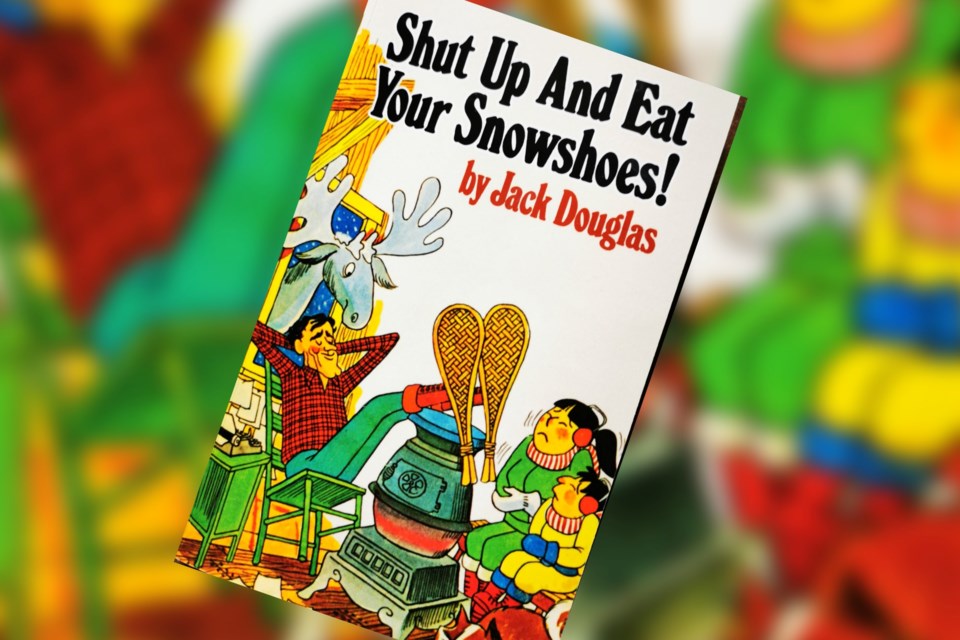Sudbury plays a role in a funny look at life in the Canadian wilderness in Shut Up and Eat Your Snowshoes! written by American comedian Jack Douglas in 1970.
A king of comedy in the early days of television, Douglas owned a hunting and fishing lodge and two small islands on Bird Lake near Killarney.
According to The Ottawa Journal (March 2, 1968), he owned a 2½-acre property with six heated cabins, a main lodge with four bedrooms and a 12-foot fireplace, a sauna and five auxiliary buildings.
In Shut Up and Eat Your Snowshoes!, Sudbury makes an appearance as Chinookville, “the fun city of the Arctic Circle set.” Bird Lake is renamed Lost Lake.
Douglas was a novelist, short story writer, columnist, actor, television personality and comedian.
He wrote gags for legendary comedians Red Skelton, Bob Hope and Woody Allen, and the television show Laugh-In.
He won an Emmy Award in 1954. His 1962 autobiography was titled A Funny Thing Happened to Me on My Way to the Grave.
Douglas and his wife, Reiko, made regular appearances on talk shows hosted by Jack Parr, Merv Griffin, Mike Douglas, David Frost and Johnny Carson.
Chinookville is a mining town, something like Sudbury, with lots of miners and “at least 20 dine and dance and juice joints, each with its own rock and roll group.”
It is a place so exciting, his wife would rather leave him than visit.
“Reiko, I yelled toward our cavernous kitchen, ‘Let’s go to Chinookvlle.’
‘I don’t want to go to Chinookville. Please don’t make me.’
I understood her concern. The trip from our island to Chinookville was something Lewis and Clark would have thought twice about, and Neill Armstrong would have been court-martialed for refusing altogether.
‘I’m going back to Japan,’ she said, and ran to the bedroom and starting throwing kimonos into a suitcase.
‘I’m going to back to Japan,’ Reiko repeated trying to jam a pair of long Ojibway snowshoes into her too-short suitcase.
‘What are you packing those for,’ I said.
‘Souvenir of Canada for my father’.”
Douglas wrote he thought Chinookville had a lot to offer.
“It has a supermarket, a television repair shop, a boutique, a salon de beauté, a government liquor store, and a few other facilities which enabled almost everyone in Chinookville to live just as House Beautiful and Amy Vanderbilt and John Lennon and Yoko say we should.
“There is another form of entertainment, not advertised as such. In the Chinookville supermarket, each product is marketed in both French and English, with French in bolder lettering. This makes for a thrilling life when you get back home, 116 miles away from the supermarket, to discover that what you thought was a can of beans turns out to be tinned Brillo.”
The Douglases lived full time in New Canaan, Conn., a picture-perfect town about an hour's train ride from New York City.
“The toughest thing about living back in the woods is explaining to friends why. Every time we see people from the outside they are astounded that: (1) we are still alive; (2) we are still healthy: and (3) we look happy. This not only astounds the – it annoys them.”
Douglas died in 1989, at age 80.
George Schlatter, creator and producer of Laugh-In was quoted in his obituary. “He (Douglas) saw the world from a different angle than the rest of us. He was not only funny, he was nice,” he said.
Vicki Gilhula is a writer in Greater Sudbury. Then & Now is made possible by our Community Leaders Program.
